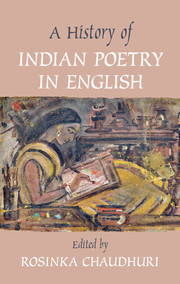Book contents
- Frontmatter
- Contents
- Contributors
- Acknowledgments
- Introduction
- SECTION I THE BROAD NINETEENTH CENTURY: INDIANS IN ENGLISH AND THE ENGLISH IN INDIA
- SECTION II PUBLISHERS, PUBLISHING HOUSES, AND THE PERIODICAL PRESS
- 9 “Zig Zag sublimity“: John Grant, the Tank School of Poetry, and the India Gazette (1822–1829)
- 10 “The Torch Not the Sceptre”: Writers Workshop, Calcutta
- 11 The Blue Rexine Archive: A Short History of Clearing House, a Poets’ Cooperative of the 1970s
- 12 “Melted Out of Circulation”: Little Magazines and Bombay Poetry in the 1960's and 1970's
- SECTION III POETRY: 1950–2000
- SECTION IV POETS OF THE DIASPORA
- SECTION V THE NEW MILLENNIUM POETS ON THEMSELVES
- Bibliography
- Index
9 - “Zig Zag sublimity“: John Grant, the Tank School of Poetry, and the India Gazette (1822–1829)
from SECTION II - PUBLISHERS, PUBLISHING HOUSES, AND THE PERIODICAL PRESS
Published online by Cambridge University Press: 05 March 2016
- Frontmatter
- Contents
- Contributors
- Acknowledgments
- Introduction
- SECTION I THE BROAD NINETEENTH CENTURY: INDIANS IN ENGLISH AND THE ENGLISH IN INDIA
- SECTION II PUBLISHERS, PUBLISHING HOUSES, AND THE PERIODICAL PRESS
- 9 “Zig Zag sublimity“: John Grant, the Tank School of Poetry, and the India Gazette (1822–1829)
- 10 “The Torch Not the Sceptre”: Writers Workshop, Calcutta
- 11 The Blue Rexine Archive: A Short History of Clearing House, a Poets’ Cooperative of the 1970s
- 12 “Melted Out of Circulation”: Little Magazines and Bombay Poetry in the 1960's and 1970's
- SECTION III POETRY: 1950–2000
- SECTION IV POETS OF THE DIASPORA
- SECTION V THE NEW MILLENNIUM POETS ON THEMSELVES
- Bibliography
- Index
Summary
In the early nineteenth century, a vocal minority of Britons, East Indians, and elite Indians educated in English publically asserted a novel “Indian” culture in favor of free trade, greater autonomy from London, liberty of the press, and polyglot education. The period under consideration overlapped with the early years of the so-called Bengal Renaissance and saw protonationalist articulations of self-determination for Indian governance and culture emerging from several new circumstances: James Silk Buckingham's journalistic critiques of company (mis)rule; Rammohun Roy's cosmopolitan agendas for religious and educational reform; Henry Derozio's and Kasiprasad Ghosh's bardic poetry; the rise of the “Young Bengal” movement as a result of both Derozio's teaching at the Hindu College as well as friction among various Hindu factions; and the proliferation of poetry published by anonymous men and women in the newspapers, weeklies, monthlies, quarterlies, and annuals of the day. The subject of the present chapter lies in an underexplored aspect of this last cultural arena – in the comic, often satiric, and usually self-consciously bad poetry that filled the pages of the India Gazette newspaper and other periodicals and that constituted a large bulk of Indian poetry in English. Without making claims for the quality of much of this verse – in many instances, its badness is part of its point – I will consider the aesthetics and politics of “light reading” in the periodical press as part of a distinctively local and Whiggish modernity, as a critical and satirical spirit relatively unmoored from metropolitan authority and open to unknown political and social futures.
Before we turn to the poetry printed in the biweekly India Gazette in the 1820s, a brief overview of the periodical press will be helpful. From the turn of the century until 1818, the press had been strictly censored in accordance with Governor General Richard Wellesley's Regulations for the Control and Guidance of Newspapers (1799), according to which every printer was required to print his name at the bottom of the newspaper, every editor and proprietor of a newspaper needed to register his name and address with the Chief Secretary of the Government, and no paper was to be published at all until it had been inspected by the Chief Secretary or his proxy, with the sole and harsh “penalty for offending against any of” these regulations “to be immediate embarkation for Europe.
- Type
- Chapter
- Information
- A History of Indian Poetry in English , pp. 147 - 161Publisher: Cambridge University PressPrint publication year: 2016
- 2
- Cited by

